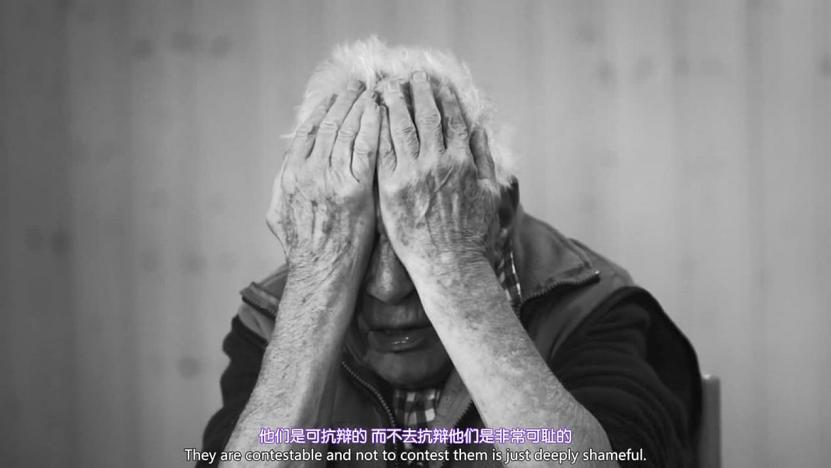

再看《昆西四季》,被片中更多的片段打动。对最近一段时间的自己启发很大,记录于此。

·战争的沉默
I mean, there’s one specific kind of silence which I personally struggled with, which is the idea of not talking to one’s children about such... possibly the inability to hand this on. You know, we talk a lot about handing experience on, “standing on each other’s shoulders”, and so the idea of your experience kind of being cauterized, and not handing it on to your children, such as my father’s generation. That silence is what I’m talking about.… And I suppose that they would say, “well, we fought so that we wouldn’t have to talk to our children about it, we fought so that our children wouldn’t know. But, “history cannot have its tongue cut out.”It doesn’t really work, that silence, because the curiosity and the need to know is still there. And they need to learn. It is not the going into battle that I find most difficult to imagine, it is coming back from battle.
The resistance of the word “inconsequential”. “To protest is to refuse being reduced to a zero and to an enforced silence. Our protests by building a barricade, taking up arms, going on a hunger strike, linking arms, shouting ,and writing, in order to save the present moment, whatever the future holds.”
·叙事,信息,与现代性
And each lion was lion, each ox was ox.
For me, a storyteller is like a passer. I mean that’s very like somebody gets contraband across the frontier. I mean, stories come to you all the time, if you listen if you listen, if you listen.
One of the features of our time is that people worship ideas. And objects, but ideas particularly. Quite arbitrary, without really understanding their meaning. I mean, take modern art. The idea of modernity, this is the criteria by which people judge things without really enquiring what makes things modern, if the thing is really modern.
I think the idea of information is power, that just more information informs a public has been disproved, right? I mean that is to say that the war crimes of the Bush administration or whatever, are just there in plain sight. But it was kind of like when you have such of this excess of information that isn’t organized, it just all becomes a kind of noise... And people are bored like there is too much of it.
In the monopolistic religions, there is this notion of Heaven and Hell. Different interpretations but these two categories. And it’s worth asking the question are the following: It’s in Hell where solidarity is important, not in Heaven, isn’t it?
The two things about John’s work that will always make me think of him as a political artist that really matters now, is that While there is a commitment-an unwavering commitment to a recognition of the hell that surrounds us and the need for solidarity, there is also an openness and attention to the sensual world that never goes away. It isn’t just baleful, it isn’t just suffering or despairing that even though it can lead to more suffering in a certain way, there is a commitment, a total commitment to being alive to the possibility of contingency and experience in the moment. The other thing is , even though there’s a commitment to talking about, preserving or memorializing or at least having a memory of modes of life and experience that have passed away, there is no nostalgia. And that, to me, is a big difference between the possibility of a kind of left storytelling and the Tea Party dressing up with historically inaccurate Revolutionary costumes. So that there’s a commitment to the possibilities of the world before us, in a sensory, sensual, libidinal, neurotic way, ’cause those energies have to be harnessed for the political. And there’s a commitment to memory and having a relationship to the dead that never degenerates into the seduction of nostalgia.
·乡村
Just as with the Internet and web, people live in an endlessly extensive present moment, with collections of the present absolutely unimaginable a little while ago. I mean, enormous extension, positive and negative in this way. But it is of the instant, but it’s as if were geographic and spatial. In the contry, and in a village like Quincy, that extension is vertical, and it’s to do with time. And that’s where the dead take prop. And the idea of children is not only all the natural reasons, but also a question of that continuity, that vertical continuity.
Interesting that for a peasant, the way he reads the landscape is completely different than ours, in the sense that what we would find, like a beautiful landscape, he could find beautiful equally, but for other reasons. That’s to say, the beauty would come from the value of the work that has been put into that landscape, which has shaped that landscape. Detail reveals something of the work done of it.
In the country where you are so open, and some kind of horizon is always there, you’re never shut in. Because you are open, every season has its particularities, some of which you like. In other words, a season isn’t something that befalls you, it is something that you inhabit.
又名:约翰伯格四季肖像(台)
上映日期:2016-02-13(柏林电影节)片长:93分钟
主演:约翰·伯格 Ben Lerner Colin MacCabe Christopher Roth Akshi Singh 蒂尔达·斯文顿
导演:Bartek Dziadosz / Colin MacCabe / Christopher Roth / 蒂尔达·斯文顿 / 编剧:Ben Lerner/蒂尔达·斯文顿 Tilda Swinton